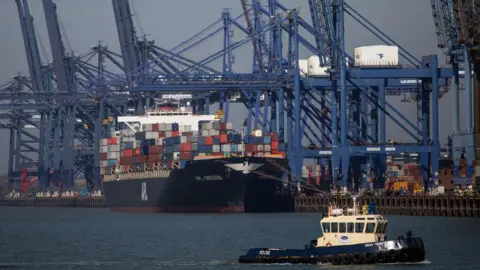Felixstowe port says HGV shortage a factor in container logjam
 Getty Images
Getty ImagesThe UK's largest commercial port says the supply chain crisis has caused a logjam of shipping containers.
The Port of Felixstowe, which handles 36% of the UK's freight container traffic, blamed the busy pre-Christmas period and haulage shortages.
However, it said the situation has been improving over the last few days.
Shipping giant Maersk told the BBC it is re-routing some of its biggest ships away from the port.
The Financial Times first reported on Tuesday that Maersk was re-routing ships away from Felixstowe to other European ports, where smaller vessels will be used for UK deliveries.
Lars Mikael Jensen, head of global ocean network at Maersk, told BBC Radio 5 Live's Drive programme that some of its largest 20,000-container ships were waiting outside Felixstowe for between four to seven days.
"We've taken those measures because we saw, because of the big ships, there is a limit to how many berths they can call in Felixstowe, and because its slower, it took longer to handle every ship," he said.
"Instead of wasting time waiting, we progressed to the next stop, and arranged that the boxes are relayed from that port rather than wait for a week and then discharge."
Problems at Felixstowe come as retailers and other groups warn of mounting concern about stocks in the run-up to Christmas trading.
The port has blamed several factors for the build-up of shipping containers, including the busy pre-Christmas peak, haulage shortages, poor vessel scheduling, and the impact of the pandemic.
On top of this, there are a high number of empty containers currently sitting at the port. Felixstowe said it is asking shipping lines to remove them as quickly as possible.
"The vast majority of import containers are cleared for collection within minutes of arriving and there are over 1,000 unused haulier bookings most days," the port stressed.
"However, the situation is improving and there is more spare space for import containers this week, than at any time since the beginning of July, when supply chain impacts first started to bite."
Driver shortage
Industry bodies estimate there is a shortage of about 100,000 drivers with several sectors from retailers to domestic refuse collection affected. The government recently drafted in military personnel to help deliver fuel and to issue emergency temporary visa to foreign drivers.
The shortage has been caused by several factors, including European drivers who went home during the pandemic, Brexit, tax changes and a backlog of HGV driver tests.
Tim Morris, head of the Major Ports Group, which represents port operators, said the industry had been had been hit by a whole host of issues, including Brexit border changes, global demand for goods travelling by sea, and the pandemic.
"It has not been easy and there have been times of real stress on the ports system," he said. "Ports have taken significant action to respond to the challenges and build resilience."
The problem is not just confined to the UK. Ports across the world have also suffered significant delays. Retailers have highlighted particular issues in China and east Asia, where pandemic restrictions and poor weather conditions have affected shipping.
Sarah Treseder, chief executive of the trade group UK Chamber of Shipping, said there are reports of dozens of ships forced to wait outside ports in America and Asia.
"We anticipate the disruption will continue while the underlying market volatility stabilises," she said.
